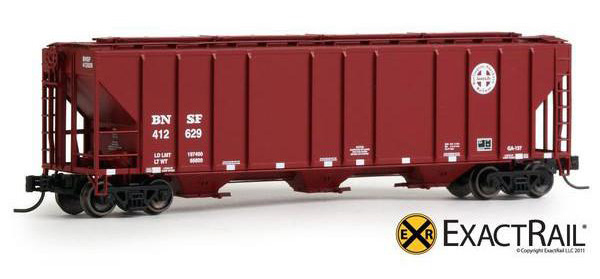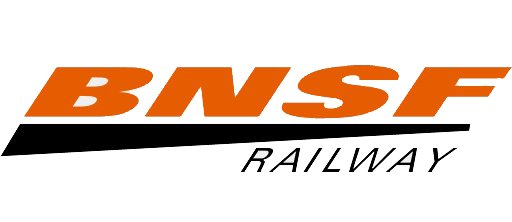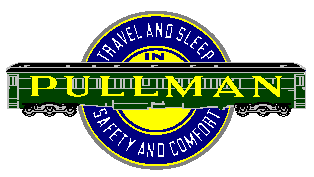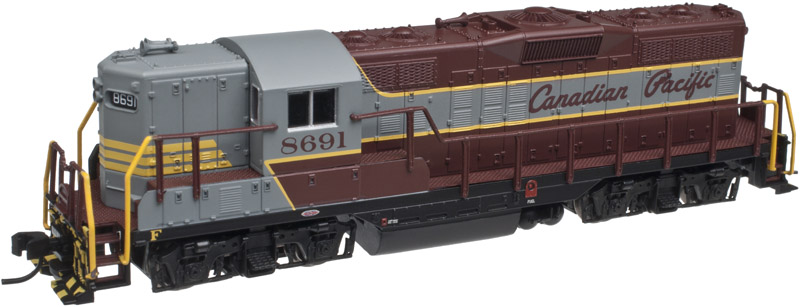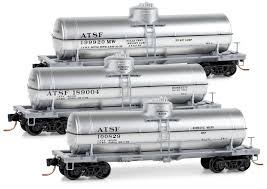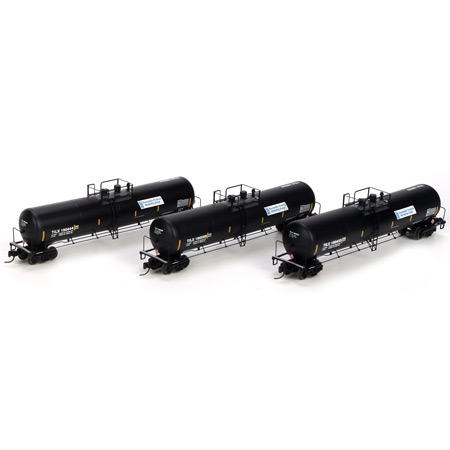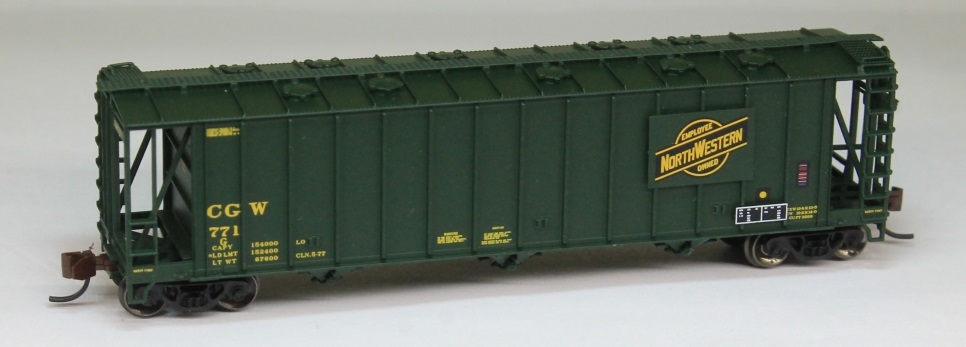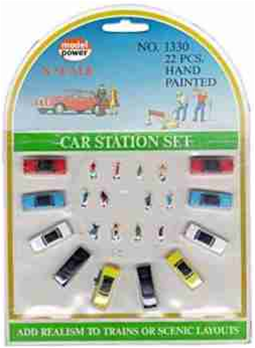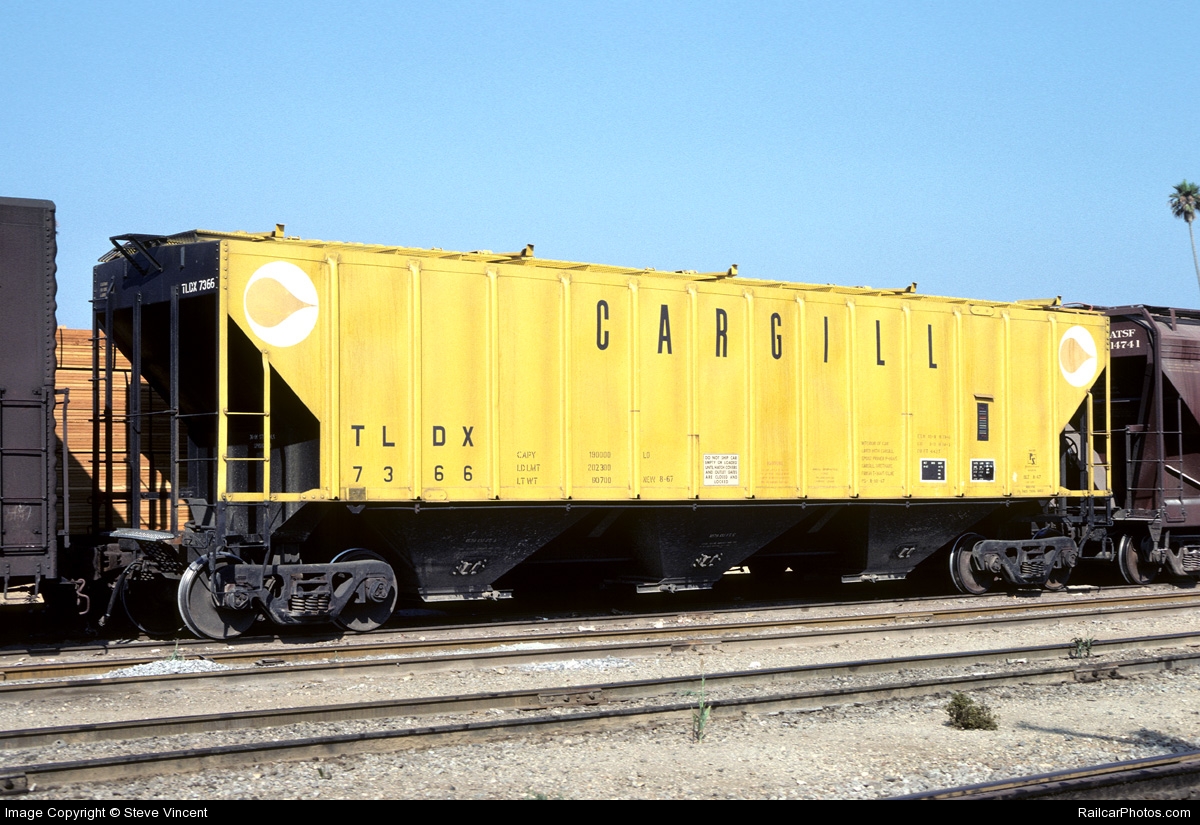Model Information: Designed, engineered, and tooled in the United States, these models have factory installed Micro-Trains Line stock number 1015 couplers, narrow-style, body mounted draft gear boxes, with shank wedges, striker casting and full nut and bolt detail, ExactRail's own ASF 100 Ton Ride Control trucks, CNC machined 36" metal wheel-sets with steel axles, accurate lettering styles and logotypes, razor sharp printing, and true to life paint colors.
Prototype History: Valued for its large capacity, roof trough hatches, and center discharge gates, the 4427 PS-2 CD High-Side Covered Hopper was a favorite for hauling grain. These large hoppers could be found across the continent hauling grain and other medium-density loads beginning in the 1960s, often in multi-car cuts or unit trains. Many are still seen in service during the fall harvest, 30 years after their construction.
Even with Pullman Standard Car Manufacturing Company's passenger car designs and patents spun off to a separate company called Pullman Technology in 1982 (which was eventually sold to Canadian based Bombardier in 1987) and Pullman Standard's remaining railcar manufacturing plants and freight car designs and patents sold to Trinity Industries in 1984, American manufactured Pullman freight and passenger cars were (and to this point in time still are) well known in North America.
When it came to hauling dry bulk goods such as agricultural commodities, cement, clay, dry chemicals, salt, or sand. many railroads and private owners selected the Pullman Standard PS-2 series covered hopper.
Utilized to transport dense and heavy granular products like cement, clay, potash, and sand, due to North American axle weight load limits, two (and later) three bay models were often chosen.
When it came to hauling much lighter commodities such as barley, corn, grain, malt, oats, soybeans, sugar, and wheat, these kinds of products would most commonly be transported in three or four bay covered hoppers.
Unlike two bay models, large four bay cars lend themselves to rapid load and discharge operations.
While there are a wide range of products covered by the PS-2 designation, it was Pullman's 4427 cubic foot capacity covered hopper that stood out as being the first of the larger capacity models to be manufactured in greater numbers.
Introduced as the PS-2CD (center discharge) in late 1963, the early production "low hip" design 4427 cubic foot capacity cars had low body sides, which concealed most of the hopper bay area.
The manufacturing of "high hip" design raised side 4427 models commenced in November 1966.
Over 19,300 PS2-CD 4,427 cars were produced.
Visibly apparent are a few different body style variations.
With the latter style being the most popular choice, the top of the covered hoppers could be fitted with large trough style openings, or, a series of round ones.
With the latter position being most common, brake wheels could be positioned high up on the body end, or, low mounted.
Even with Pullman Standard Car Manufacturing Company's passenger car designs and patents spun off to a separate company called Pullman Technology in 1982 (which was eventually sold to Canadian based Bombardier in 1987) and Pullman Standard's remaining railcar manufacturing plants and freight car designs and patents sold to Trinity Industries in 1984, American manufactured Pullman freight and passenger cars were (and to this point in time still are) well known in North America.
When it came to hauling dry bulk goods such as agricultural commodities, cement, clay, dry chemicals, salt, or sand. many railroads and private owners selected the Pullman Standard PS-2 series covered hopper.
Utilized to transport dense and heavy granular products like cement, clay, potash, and sand, due to North American axle weight load limits, two (and later) three bay models were often chosen.
When it came to hauling much lighter commodities such as barley, corn, grain, malt, oats, soybeans, sugar, and wheat, these kinds of products would most commonly be transported in three or four bay covered hoppers.
Unlike two bay models, large four bay cars lend themselves to rapid load and discharge operations.
While there are a wide range of products covered by the PS-2 designation, it was Pullman's 4427 cubic foot capacity covered hopper that stood out as being the first of the larger capacity models to be manufactured in greater numbers.
Introduced as the PS-2CD (center discharge) in late 1963, the early production "low hip" design 4427 cubic foot capacity cars had low body sides, which concealed most of the hopper bay area.
The manufacturing of "high hip" design raised side 4427 models commenced in November 1966.
Over 19,300 PS2-CD 4,427 cars were produced.
Visibly apparent are a few different body style variations.
With the latter style being the most popular choice, the top of the covered hoppers could be fitted with large trough style openings, or, a series of round ones.
With the latter position being most common, brake wheels could be positioned high up on the body end, or, low mounted.
Road Name History: The BNSF Railway (reporting mark BNSF) is one of the largest freight railroad networks in North America, second to the Union Pacific Railroad (UP) (its primary competitor for Western U.S. freight), and is one of seven North American Class I railroads. It has 48,000 employees, 32,500 miles (52,300 km) of track in 28 states, and over 8,000 locomotives. It has three transcontinental routes that provide high-speed links between the western and eastern United States. BNSF trains traveled over 169 million miles in 2010, more than any other North American railroad.[2] The BNSF and UP have a duopoly on all transcontinental freight rail lines in the Western U.S. and share trackage rights over thousands of miles of track.
According to corporate press releases, the BNSF Railway is among the top transporters of intermodal freight in North America. It also hauls bulk cargo. For instance, the railroad hauls enough coal to generate roughly ten percent of the electricity produced in the United States.
Headquartered in Fort Worth, Texas, the railroad is a wholly owned subsidiary of Berkshire Hathaway Inc.
The creation of BNSF started with the formation of a holding company, the Burlington Northern Santa Fe Corporation on September 22, 1995. This new holding company then purchased the Atchison, Topeka and Santa Fe Railway (often called the "Santa Fe") and Burlington Northern Railroad, and formally merged the railways into the Burlington Northern and Santa Fe Railway on December 31, 1996. On January 24, 2005, the railroad's name was officially changed to "BNSF Railway," using the initials of its original name.
In 1999, Burlington Northern Santa Fe and the Canadian National Railway announced their intention to merge and form a new corporation entitled North American Railways to be headquartered in Montreal, Canada. The United States' Surface Transportation Board (STB) placed a 15-month moratorium on all rail mergers, which ended this merger.
On November 3, 2009, Warren Buffett's Berkshire Hathaway announced it would acquire the remaining 77.4 percent of BNSF it did not already own for $100 per share in cash and stock - a deal valued at $44 billion. The company is investing an estimated $34 billion in BNSF and acquiring $10 billion in debt. On February 12, 2010, shareholders of Burlington Northern Santa Fe Corporation voted in favor of the acquisition.
According to corporate press releases, the BNSF Railway is among the top transporters of intermodal freight in North America. It also hauls bulk cargo. For instance, the railroad hauls enough coal to generate roughly ten percent of the electricity produced in the United States.
Headquartered in Fort Worth, Texas, the railroad is a wholly owned subsidiary of Berkshire Hathaway Inc.
The creation of BNSF started with the formation of a holding company, the Burlington Northern Santa Fe Corporation on September 22, 1995. This new holding company then purchased the Atchison, Topeka and Santa Fe Railway (often called the "Santa Fe") and Burlington Northern Railroad, and formally merged the railways into the Burlington Northern and Santa Fe Railway on December 31, 1996. On January 24, 2005, the railroad's name was officially changed to "BNSF Railway," using the initials of its original name.
In 1999, Burlington Northern Santa Fe and the Canadian National Railway announced their intention to merge and form a new corporation entitled North American Railways to be headquartered in Montreal, Canada. The United States' Surface Transportation Board (STB) placed a 15-month moratorium on all rail mergers, which ended this merger.
On November 3, 2009, Warren Buffett's Berkshire Hathaway announced it would acquire the remaining 77.4 percent of BNSF it did not already own for $100 per share in cash and stock - a deal valued at $44 billion. The company is investing an estimated $34 billion in BNSF and acquiring $10 billion in debt. On February 12, 2010, shareholders of Burlington Northern Santa Fe Corporation voted in favor of the acquisition.
Brand/Importer Information: Dedicated to creating replicas that continue to define standards for precision and authenticity, through its unique expertise in mold creation and product design, Provo, Utah based ExactRail has produced some of the industry's most acclaimed models; true benchmarks for quality over the last decade.
With the N-Scale Series, ExactRail offers precision micro-tooled replicas in 1:160 scale. Each model features fine-scale detail, expert hand-assembly and the finest finish-work in the industry. ExactRail's N-scale Series offers enthusiasts innovative small scale replicas with unprecedented quality and design.
With the N-Scale Series, ExactRail offers precision micro-tooled replicas in 1:160 scale. Each model features fine-scale detail, expert hand-assembly and the finest finish-work in the industry. ExactRail's N-scale Series offers enthusiasts innovative small scale replicas with unprecedented quality and design.
Item created by: nscalestation on 2020-11-28 17:55:40. Last edited by nscalestation on 2020-11-28 17:55:41
If you see errors or missing data in this entry, please feel free to log in and edit it. Anyone with a Gmail account can log in instantly.
If you see errors or missing data in this entry, please feel free to log in and edit it. Anyone with a Gmail account can log in instantly.


